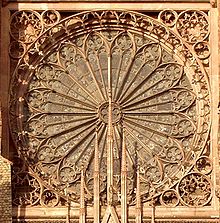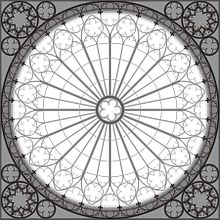


Rose window is often used as a generic term applied to a circular window, but is especially used for those found in Gothic cathedrals and churches. The windows are divided into segments by stone mullions and tracery. The term rose window was not used before the 17th century and comes from the English flower name rose.[1]
The name "wheel window" is often applied to a window divided by simple spokes radiating from a central boss or opening, while the term "rose window" is reserved for those windows, sometimes of a highly complex design, which can be seen to bear similarity to a multi-petalled rose. Rose windows are also called "Catherine windows" after Saint Catherine of Alexandria, who was sentenced to be executed on a spiked breaking wheel. A circular window without tracery such as are found in many Italian churches, is referred to as an ocular window or oculus.
Rose windows are particularly characteristic of Gothic architecture and may be seen in all the major Gothic cathedrals of Northern France. Their origins are much earlier than Gothic architecture, however, and rose windows may be seen in various forms throughout the Medieval period. Their popularity was revived, with other medieval features, during the Gothic revival of the 19th century, so that they are seen in Christian churches all over the world.[2]
- ^ Oxford English Dictionary, s.v. "rose-window" ([f. ROSE n. + WINDOW n.]).
- ^ Dow, Helen J. (December 1957). "The Rose-Window". Journal of the Warburg and Courtauld Institutes. 20 (3/4): 248–297. doi:10.2307/750783. JSTOR 750783. S2CID 195029297. Retrieved 25 September 2020.